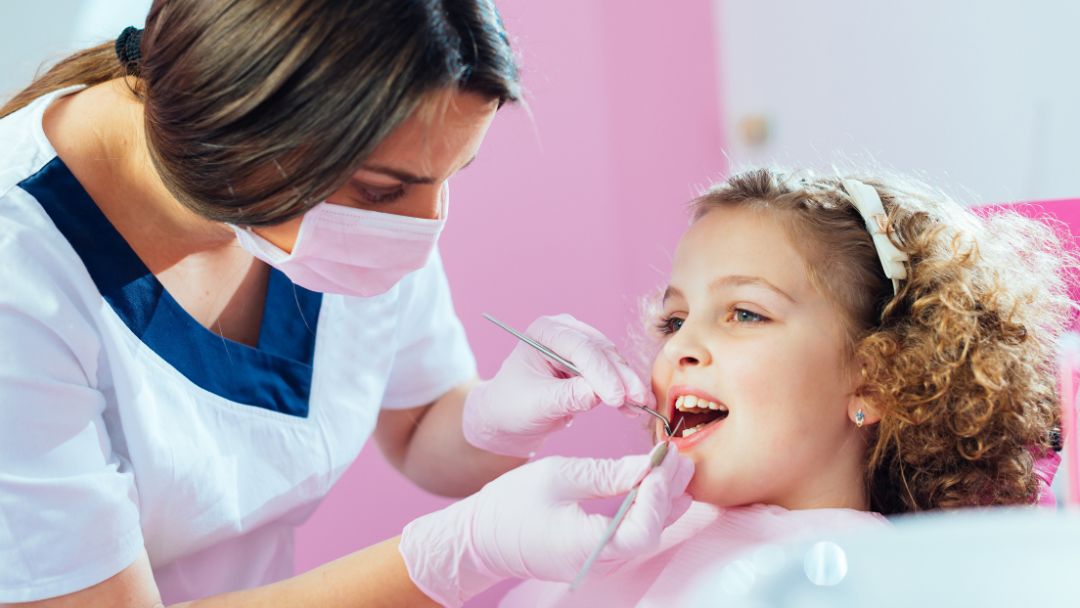Outline:
- Introduction
- Importance of Dental Hygiene for Kids
- Start Early: Introducing Oral Care in Infancy
- Brushing Techniques for Children
- The Right Toothpaste and Toothbrush for Kids
- Flossing Made Fun and Easy
- Healthy Eating Habits for Strong Teeth
- Limit Sugary Snacks and Drinks
- Regular Dental Check-ups for Kids
- Teaching Good Oral Hygiene Habits
- Setting a Positive Example
- Overcoming Dental Anxiety in Children
- Protecting Teeth During Sports Activities
- Dealing with Tooth Loss and the Arrival of Permanent Teeth
- Conclusion
- FAQs
Introduction
Good dental hygiene is essential for maintaining the oral health of children. Teaching your child proper oral care habits from an early age sets the foundation for a lifetime of healthy smiles. In this article, we will provide valuable tips and guidance on how to care for your child’s teeth, ensuring optimal dental hygiene for kids.
Importance of Dental Hygiene for Kids
Healthy teeth and gums are vital for proper speech development, chewing, and overall well-being. Establishing good oral hygiene practices during childhood helps prevent dental issues such as cavities, gum disease, and tooth decay. By prioritizing dental hygiene for kids, parents can contribute to their children’s long-term oral health.
Start Early: Introducing Oral Care in Infancy
It’s never too early to begin caring for your child’s teeth. Even before the first tooth erupts, you can gently clean your baby’s gums with a clean, damp cloth. Once the first tooth appears, start using a soft-bristled infant toothbrush to clean it.
Brushing Techniques for Children
Teaching your child proper brushing techniques is crucial for effective dental hygiene. Use a pea-sized amount of fluoride toothpaste and guide your child to brush gently in circular motions. Ensure they brush all surfaces of their teeth, including the front, back, and chewing surfaces.
The Right Toothpaste and Toothbrush for Kids
Choosing the right toothpaste and toothbrush for your child is essential. Select a fluoride toothpaste specifically designed for kids, as it helps strengthen their tooth enamel. Opt for a child-sized toothbrush with soft bristles that can comfortably fit in their mouth.
Flossing Made Fun and Easy
Introduce flossing to your child as soon as their teeth start touching each other. Teach them how to use floss picks or flossers, which are easier for children to handle. Make flossing a fun activity by using colorful flossers or playing their favorite music while they floss.
Healthy Eating Habits for Strong Teeth
A balanced diet plays a significant role in maintaining healthy teeth. Encourage your child to eat a variety of fruits, vegetables, whole grains, and lean proteins. These foods provide essential nutrients that promote strong teeth and gums.
Limit Sugary Snacks and Drinks
Excessive consumption of sugary snacks and drinks can lead to tooth decay. Limit your child’s intake of sugary treats, soda, and juices. Encourage them to choose healthier alternatives like water and fresh fruits.
Regular Dental Check-ups for Kids
Regular dental check-ups are crucial for monitoring your child’s oral health. Schedule dental appointments every six months or as recommended by your dentist. These visits allow dentists to detect any dental issues early on and provide necessary treatments.
Teaching Good Oral Hygiene Habits
Educate your child about the importance of good oral hygiene habits. Explain why brushing, flossing, and regular dental visits are essential for maintaining healthy teeth. Encourage them to take responsibility for their oral health and make oral care a daily routine.
Setting a Positive Example
Children learn by observing their parents’ behavior. Set a positive example by practicing good oral hygiene habits yourself. Brush and floss together as a family, making it a fun and bonding experience.
Overcoming Dental Anxiety in Children
Some children may experience dental anxiety, making dental visits challenging. Create a positive and comfortable environment by choosing a pediatric dentist experienced in treating children. Talk to your child about the dental visit in a reassuring manner, addressing their fears and concerns.
Protecting Teeth During Sports Activities
If your child participates in sports activities, ensure they wear a mouthguard to protect their teeth from potential injuries. Mouthguards provide a cushioning effect and help prevent tooth fractures and other oral injuries.
Dealing with Tooth Loss and the Arrival of Permanent Teeth
As your child starts losing their baby teeth, emphasize the importance of proper dental care for their permanent teeth. Teach them how to brush and floss their new teeth and explain the significance of taking care of them for a lifetime.
Conclusion
Caring for your child’s teeth is a responsibility that should not be overlooked. By following these tips and incorporating good dental hygiene practices into their daily routine, you can help your child maintain a healthy smile and establish a strong foundation for their oral health throughout their lives.
FAQs
- When should I start taking my child to the dentist?
- It is recommended to take your child for their first dental visit by their first birthday or within six months of their first tooth eruption.
- How often should my child brush their teeth?
- Children should brush their teeth at least twice a day, preferably after breakfast and before bedtime.
- Can my child use adult toothpaste?
- It is advisable to use fluoride toothpaste specifically formulated for kids to ensure the right amount of fluoride for their age.
- How can I make dental visits more enjoyable for my child?
- Choose a pediatric dentist experienced in working with children and explain the dental visit in a positive and reassuring manner.
- When should my child start flossing?
- Your child should start flossing as soon as their teeth start touching each other, usually around the age of 2 to 3.
